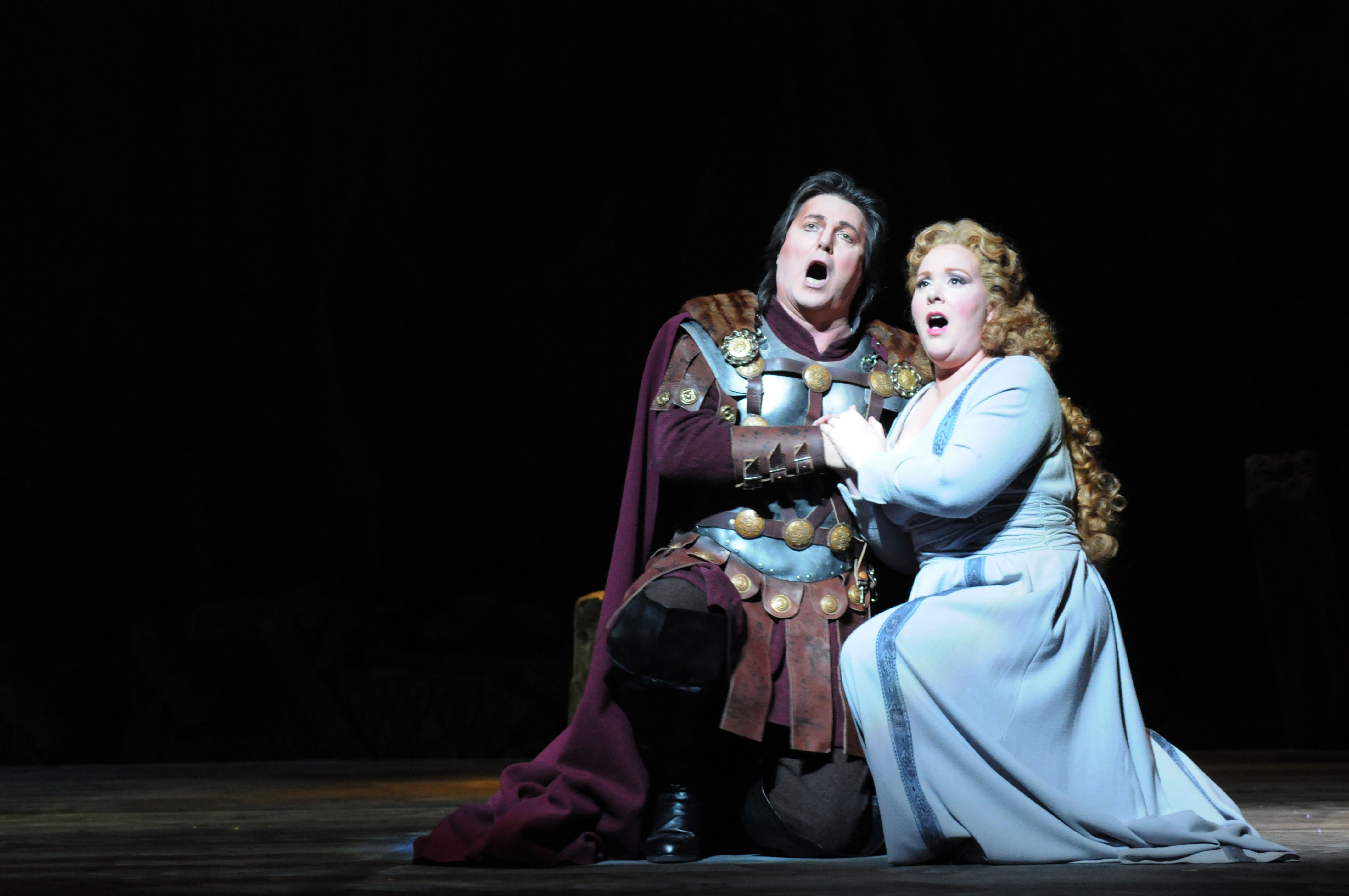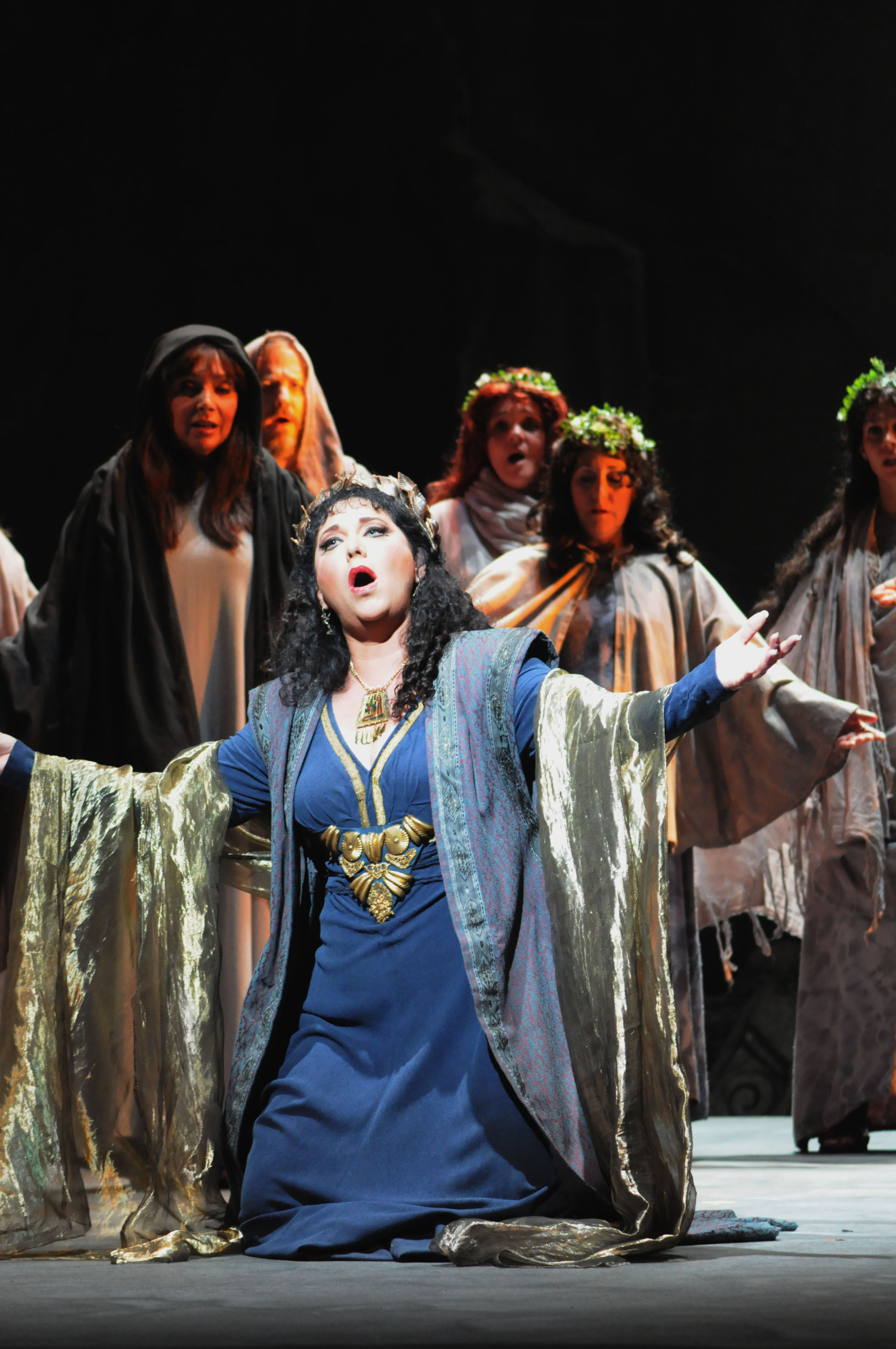Love and death among the Druids: Swenson lifts a routine “Norma” in Palm Beach
 In the words of an old Monty Python sketch, it really is “too silly, too silly.” Druids versus the Romans via an implausible love triangle, the cutting of the sacred mistletoe, “mystic verbena,” etc.
In the words of an old Monty Python sketch, it really is “too silly, too silly.” Druids versus the Romans via an implausible love triangle, the cutting of the sacred mistletoe, “mystic verbena,” etc.
The trick in Bellini’s Norma is to field a trio of terrific singers for the major roles who can bring theatrical fire and vocal artillery to Bellini’s glorious score while making one forget the scenario’s inherent absurdities.
Palm Beach Opera opened its weekend run of Norma Friday night at the Kravis Center, with the first of two casts that will alternate through Monday. Yet despite the dynamic, hyperkinetic conducting of artistic director Bruno Aprea and one standout performance, opening night offered a lackluster Norma, with an uneven cast and static stage direction making for a rather long evening.
In the second female lead, Ruth Ann Swenson so dominated the evening as Norma’s friend and rival in love that for these performances, the opera should probably be retitled, Adalgisa.
Swenson’s extended scenes with Pollione and Norma gave us the finest moments of the evening, the low voltage rising several notches whenever she was on stage. The Met soprano showed complete comfort with this mezzo role, and displayed true star quality, singing with rich, gleaming weight, purity of tone, easy flexibility and brilliant top notes.
While rarely offering Met stars like Swenson, Palm Beach Opera usually can be relied upon for solid casting of principal roles, which makes the assignment of Norma to Elizabeth Blancke-Biggs even more puzzling.
The American soprano—a worthy Tosca and Minnie for Florida Grand Opera in past seasons— has a clear, resplendent instrument, but Blancke-Biggs is not a Norma by voice or temperament. Her low-lying soprano is ill-suited to the role’s bel canto elements and coloratura demands, as was clear in a wobbly Casta Diva and her shaky moments in the high tessitura. The ensuing cabaletta was taken at a cautious pace as were most of Norma’s coloratura passages, which made for an enervating effect.
Blancke-Biggs’ acting was a bit stagey and old -fashioned as well. She was at her best in moments she shared with Swenson, the two sopranos singing well in Mira, O, Norma and their long Act 1 scene. It was hard to avoid feeling that the two women should have been singing each other’s roles. In fact at times it appeared that they were, with Swenson rather than Norma delivering the gleaming top note at the end of Act 1, which is taking Druid sisterhood a bit too far.
Renzo Zulian was a sturdy Pollione. The Italian tenor didn’t appear at ease with the role’s top range but Zulian possesses a solid middleweight tenor and sang with strength and dramatic conviction, bringing some credible characterization to the role of the two-timing Roman.
Luiz Ottavio Faria was a big voiced dry-toned Oroveso, Rolando Sanz and Susan Jean Hellman serviceable as Flavio and Clotilde. Artistic director Aprea led with his characteristic intensity and idiomatic touch.
The towering stone walls of John Conklin’s unit set offered an unvaried but effective bit of imposing primeval gloom. Linda Brovsky’s traffic-cop direction let the action sag in several places and too often took the fizz off the drama. The chorus, men in particular, sang with power and impact, though having the female Druids do dervish-like spins during the climactic warlike chorus was a bizarre inspiration. The action of Act 2 and the ensemble scenes were almost stolen by the two adorable, unbilled, kids, playing Norma’s children.
Elizabeth Blancke-Biggs, Ruth Ann Swenson and Renzo Zulian will perform Norma again Sunday at 2 p.m. Saturday at 7:30 p.m. and Monday at 2 p.m. Jennifer Check, Allan Glassman and Wendy Bryn Harmer will sing the principal roles. 561-833-7888: www.pbopera.org.
Posted in Performances
Leave a Comment
Sat Jan 24, 2009
at 5:52 pm
No Comments







